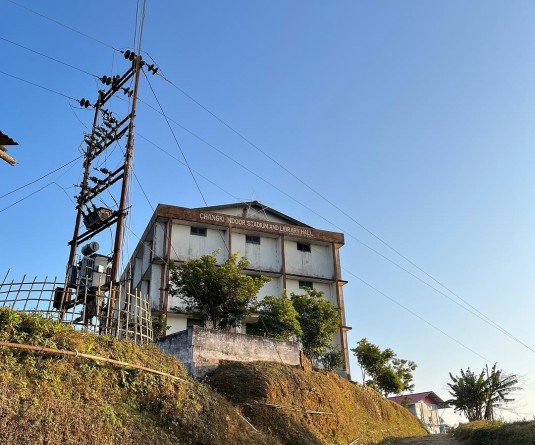
Morung Express News
Kohima | December 19
To engage young people in climate change issues and enabling them to take the lead through practical steps, a talk on Climate change by Dr. Robert Mizo and organised by PenThrill Publication House was held on December 19 at DCafe, Jail Colony, Kohima.
The opening remark was delivered by Vishü Rita Krocha, Founder and Publisher of PenThrill Publication House who shared her thoughts on the theme of the talk ‘Youth and Climate Change’. Because young people form a majority of the world’s population, Krocha viewed that the climate change is an issue that everybody should be concerned about and that young people can be the zest, energy, creativity to deliver the change that the world needs.
Rekha Rose Dukru, Co-founder of Eden Farm provided a farmer’s perspective on climate change in relation to farmers in Nagaland. While a lot of blame is put on farmers for global warming, Dukru was of the view that Farmers especially in Nagaland contribute to the protection of the environment.
“Climate change may not be felt so strongly here as other parts of the country but we cannot deny that it is not here with us today. Frequent landslides, erratic and excessive rainfall, strong winds, scarcity of water are some of the visible signs of climate change. Climate change and agriculture are interrelated in all ways,” said Dukru.
She added that conversion of non-agricultural land into agricultural land leads to more deforestation and clearing of forest affecting water source. “But this change of climatic conditions has also allowed farmers to farm varieties of crops and also have increased some crop yields but to realize the benefits the farmers should also know that nutrient levels, soil moisture, water availability and other conditions must also be met so that nutritional quality of foods can be maintained,” viewed Dukru.
She further provided suggestions as a farmer to protect environment such as discouraging the use of fertilizers and chemicals, promotion of organic farming, educate Farmers on cropping pattern, identify more suitable crops to grow, adopt resilient crops such as millets, and diversification of crops where collectivization can be done. She also recommended the strengthening and utilization of the knowledge of environmentalists, agriculturalists and researchers to study and assist the farmer in fighting climate change and further create an eco system and influence policy makers. Dr Mizo, an environmentalist and Asst. Professor at Kamala Nehru College, University of Delhi, spoke on the impact of climate change around the world and why the crisis should be everyone’s concern. Climate change has direct implications on the geophysical, social, economic, political and cultural aspect of any country and society, maintained Dr. Mizo pointing out that global warming can affect health and food security, loss of capital and wealth, trigger conflicts, increase environmental refugees and changes a peoples’ historical progression.
Despite irrelevant claims made on climate change being a hoax, Dr. Mizo stated that dealing with climate change is conducive for the betterment of the world as a whole. A shift from anthropocentrism (human-centered) to eco-centrism (placing intrinsic value to the ecosystem and all living organisms) was emphasized by Dr. Mizo.
Further placing high hopes on the young, Dr. Mizo affirmed that it is the young, educated and empowered, who can be agents of change. “Where we don’t have a environmentally concerned government, it is the youth that needs to take up the issue of climate change and persuade the government to be environmentally concerned,” said Dr. Mizo.
He suggested the young take up steps such promoting cleaner lifestyles, adopting and enforcing discipline and guardianship of the planet, reducing the use of plastics, and create innovative ideas based on clean energy.
As innovators, he stated the youth should generate ideas to consume less and use more efficient energy, initiate dialogues with policy makers or NGOs and make use of the power of IT and social networking. The youth, he stated, can affect change by being advocates, agents between environment and leaders, using their profession to influence others on climate change.





